U.S. Health Secretary RFK Jr says we are being “poisoned” by seed oils. He has urged Americans to stop using them and return to old-school fats like butter and beef tallow. His warning sparked headlines and even got fast-food chains to change their cooking oils.
But is this concern grounded in science, or is it just another viral panic? Let’s break it down.
What are Seed Oils, Really?
Seed oils have been around since the 1950s. They are made from plants like soybeans, sunflower, canola (rapeseed), corn, and grapeseed. You will find them in most kitchens - and in a ton of packaged foods. They are cheap, easy to cook with, and neutral in flavor. So, why the sudden outrage?

RFK Jr / IG / MAHA advocate RFK Jr claims the issue starts with how seed oils are made. Most are extracted using a chemical called hexane, which is toxic in high amounts.
By the time the oil is bottled, that hexane is basically gone. Regulators in both the U.S. and Europe have strict limits. In fact, the trace levels left are so tiny they are considered safe by global health authorities.
People also worry about the refining process. These oils are bleached and deodorized, which makes them shelf-stable and neutral-tasting. Critics say this makes them “unnatural,” and that alone is a red flag. But nutrition experts say otherwise. These steps actually remove harmful substances from the oil, making it safer - not worse - for consumption.
Are Seed Oils Really Inflammatory?
Another big claim RFK Jr and wellness influencers throw around is that seed oils are “inflammatory.” This argument centers on omega-6 fats, especially linoleic acid, which is common in these oils. The idea is that eating too much omega-6 blocks your body from using anti-inflammatory omega-3s. Sounds like a problem, right?
Not so fast. This theory falls apart in real human studies. What happens in a lab dish or a mouse doesn’t always reflect real life. In humans, linoleic acid doesn’t cause inflammation. In fact, many trials show it can actually reduce it. Plus, linoleic acid is essential. Your body needs it to function properly.
What the Science Says About Heart Health?
RFK Jr paints seed oils as a modern health disaster, linking them to obesity and chronic disease. However, research shows the opposite. Increased seed oil consumption over the past 50 years actually lines up with lower rates of heart disease. Swapping animal fats like butter for plant oils has led to better cholesterol levels and fewer heart problems.

Ewei / Pexels / A major Harvard-led study recently tracked over 200,000 adults for more than 30 years. People who replaced just one tablespoon of butter a day with a seed oil like soybean or canola had a 17% lower risk of dying from any cause,
And the same drop in cancer deaths. That is no small effect.
So, why does this debate keep heating up? Part of it comes from older studies. One 1960s trial showed people with heart disease ate more seed oil. But those oils were often in margarine, which back then contained trans fats. A known health hazard. Today’s seed oils don’t have those, but the reputation stuck.
Still, the fear spreads online. Influencers get clicks by calling seed oils “toxic” or “fake.” The science doesn’t support that, but it is harder for calm voices to cut through the noise. Scientists like Sarah Berry and Tom Sanders, who have studied nutrition for decades, say these oils are not only safe! They are beneficial when used in normal cooking.
Should You Ditch Seed Oils?
Ditching seed oils for butter or lard might sound “natural,” but it can raise your cholesterol and increase heart disease risk. The American Heart Association still recommends choosing plant-based oils over saturated fats for long-term health.
That doesn’t mean you need to chug seed oil or avoid butter forever. The best diet is still one that is balanced. Use olive oil, avocado oil, and yes, seed oils if you like. Cook at home more. Eat less packaged junk.











